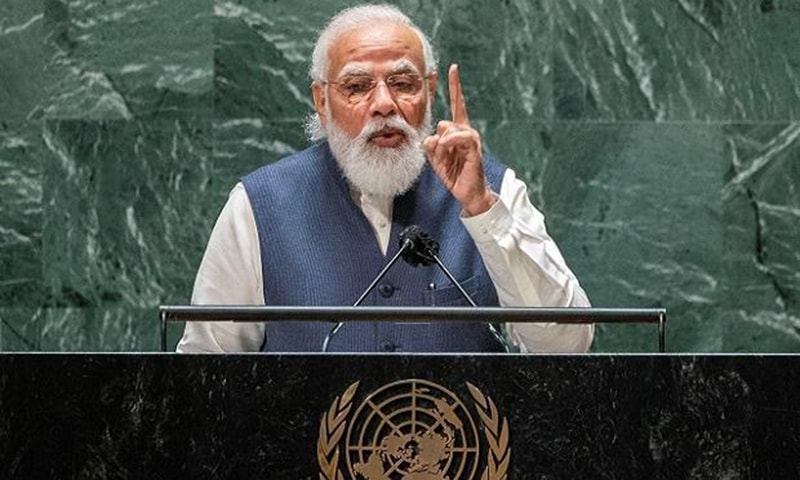UNITED NATIONS: Indian Prime Minister Narendra Modi used his speech at the 76th session of the UN General Assembly on Saturday to highlight his concerns about Pakistan and China, although he did not name either.
“We need to ensure that no country tries to take advantage of the delicate situation in Afghanistan and use it for its own selfish interests,” he said, without naming the country he was worried about. But both Indian and US media reported his statement as “an apparent reference to Pakistan”.
Hundreds of Kashmiris and Sikhs protested outside the UN headquarters in New York as Mr Modi spoke inside the building.
Mr Modi, who was in Washington for meetings with US President Joe Biden and Vice President Kamala Harris, travelled to New York to address the UNGA, instead of doing it electronically like some other world leaders.
Hundreds of Kashmiris and Sikhs protest outside UN headquarters in New York as Indian PM speaks inside building
The Indian leader then underlined the need to protect oceans from “the race for expansion and exclusion” and again he did not say which country was expanding its influence over the oceans.
The media, however, noted that “India and China have long competed for influence in the Indian Ocean”.
The Times of India called this “a sharp dig at both Pakistan and China” and the US media noted that Mr Modi “targets neighbours at the UN, but not by name”.
In seeking to contain Pakistan’s growing influence in Afghanistan, Mr Modi echoed at least part of the message that Foreign Minister Shah Mahmood Qureshi shared with world leaders during his week-long stay in New York.
“At this time, people of Afghanistan — women, children and minorities — need help. We must fulfil our duties by providing them with assistance,” he said.
In his engagements with world leaders, Mr Qureshi also emphasised this point, besides asking for political and economic engagement with Kabul’s new, Taliban rulers.
“Oceans are a shared heritage — and the lifeline of international trade,” Mr Modi said in his indirect reference to China. “We must protect them from the race of expansion. The international community must speak in once voice to strengthen a rule-based world order.”
As Mr Modi championed the rights of Afghan women and children, the Sikhs and Kashmiris protesting outside the building reminded him that his own government was committing worse human right violations in the occupied Kashmir and other areas.
Mr Modi also sought the United Nations’ support to contain China, saying that the UN must act now if it wants to protect its credibility.
“The UN faces many tough questions today, (including) the proxy war in several parts of the world and the Afghan crisis” that “have deepened these challenges,” he said.
But as he sought UN indulgence in containing China, Kashmiris protesting outside reminded him of UN resolutions on Kashmir that have remained unimplemented for seven decades. “Implement UN resolutions on Kashmir first,” they chanted.
On Friday, the US vice president also spoke about these concerns in remarks at her office before a close-door meeting with the Indian prime minister.
Ms Harris, America’s first vice president of Indian origin, told Mr Modi that as democracies around the world were under threat “it is imperative that we defend democratic principles and institutions within our respective countries”.
“I know from personal experience and from my family of the commitment of the Indian people to democracy,” she said, “and the work that needs to be done [so that] we can begin to imagine, and then actually achieve, our vision for democratic principles and institutions.”
“The remarks marked a subtle change from the Trump administration’s unquestioned fidelity to the populist Modi, who has presided over an increase in religious polarisation in his country, with more laws targeting religious minorities, including its large Muslim population, as well as attacks on non-Hindus,” The Los Angeles Times noted in a report on her remarks.
Mr Modi also raised in his speech the Trump administration’s claim that the Covid-19 virus had originated in China. “With regard to the origin of Covid-19, … institutions of global governance have damaged their (own) credibility” by not holding someone responsible for the spread, he said.
Published in Dawn, September 26th, 2021















































